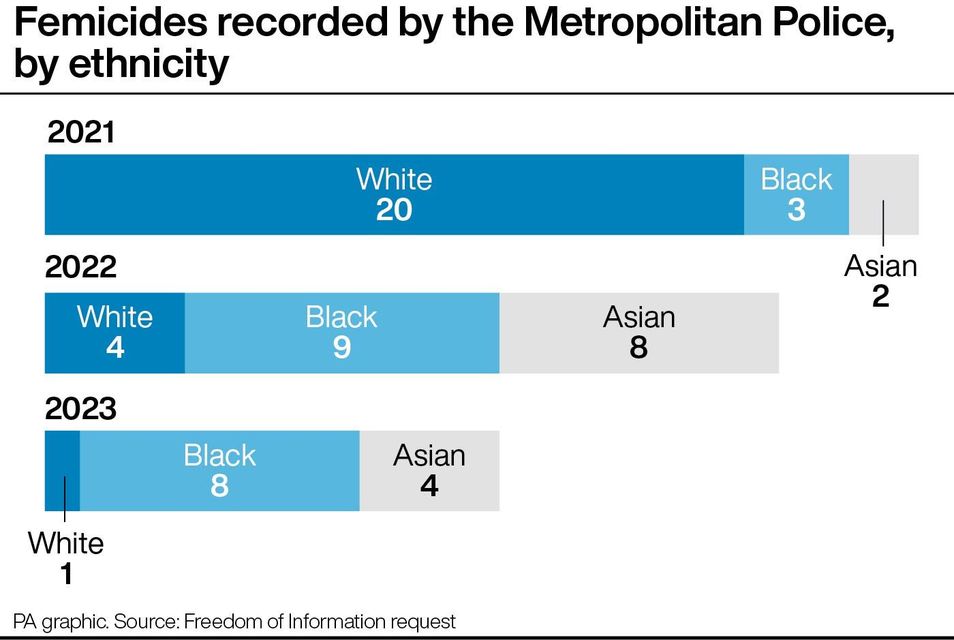By Jamel Smith, PAMon 27 May 2024 at 17:01
Black women in London are said to be facing a “crisis”, with higher rates of femicide in the capital than other ethnic groups, figures suggest.
Femicide broadly refers to the killing of a woman or girl because of her gender, highlighting the issue of violence targeted specifically at females.
Southall Black Sisters, an organisation dedicated to assisting society’s most marginalised victims of abuse, said that while the findings are “really shocking,” it sadly does not come as a surprise that there is a disproportionate impact on black women.
The figures have been obtained by the PA news agency from the Metropolitan Police in a Freedom of Information request. They show that:

Femicides recorded by the Metropolitan Police, by ethnicity
– Of the 21 femicide victims recorded by the Metropolitan Police in 2022, nine (43%) were black while eight of the 13 victims in 2023 (62%) were black.
– These figures suggest black women are being disproportionately targeted when compared with the ethnic breakdown of the female population of London, where just 14% are black, according to the 2021 census.
– By contrast, four of the 21 victims in 2022 were white, along with one of the 13 victims in 2013, while white women make up over half (53%) of London’s female population.
– The pattern was different in 2021, however, with 25 femicide victims recorded by the Met, of whom 20 (80%) were white and three (12%) were black.
Met Police data also shows that sharp instruments were the most common method for killing the victims, being used in 13 of the 25 femicides recorded in 2021, 16 of the 21 in 2022 and seven of the 13 in 2023.
The Femicide Census, a database providing detailed information on women killed in the UK and their perpetrators, criticised the Met Police and the Mayor of London, saying they “simply don’t care enough” about femicide.
Clarrie O’Callaghan, 49, from the Femicide Census, told PA that there has been a “woeful disregard” for the experiences of black and minoritised women in London.
She added that despite multiple freedom of information requests, the Met Police for nearly a decade has never provided them with data similar to that provided to the PA until this year.
She said: “The fact that they (Met Police) have steadfastly resisted giving us the data… it’s a good indicator to say, where are their priorities, where do they want to focus attention.”
Selma Taha, 52, from Southall Black Sisters, said: “Racism and sexism are deeply entrenched in the UK’s system. At the intersection of race and sex, black women are disproportionately impacted and failed as a result. Black femicide is a form of violence against women and girls (VAWG) that reflects these prejudices, both in the act of violence and in the systemic response to it.
“Why is the value of black women’s lives so obsolete, they’re facing a crisis… we need politicians and the police to step up.”
Commander Kevin Southworth, who leads Public Protection for the Met, said: “We take violence against women and girls in all its forms extremely seriously and are dedicated to being open and transparent with our data.
“We provided data for all women who had been killed between 1 January 2021 and 31 December 2021 to the Femicide Consensus – the data that was not released was due to families who did not wish for the victims’ data and details to be shared in any form.
“We are committed to protecting those who are at risk, regardless of their ethnicity or faith, and understand that communities are affected in different ways. We work with victim-survivors, charities and partners to listen to, transform and improve our response to all victims.”
A spokesperson for Mayor of London Sadiq Khan said: “The Mayor is committed to ensuring that ending the epidemic of violence against women and girls is treated with the utmost urgency both by our police, and society as a whole.
“Sadiq has invested a record £163 million as part of his public health approach to tackle violence against women and girls, which includes targeted funding to support community organisations working with women and girls from black, Asian and minority-ethnic communities and other minoritised groups, including the LGBTQ+ community.
“But there is more to do, which is why the Mayor has prioritised a new comprehensive 10-point plan to tackle offending and fund new free independent legal advice for survivors of rape and serious sexual offences so that they can receive the vital support they need and deserve.
“And is supporting the ‘New Met for London’ plan, to overhaul the way the force deals with offences involving women and girls. This includes providing better training for officers, more resources for specialist investigative teams and focused action on the worst offenders so we can build a safer London for all.”
No comments:
Post a Comment